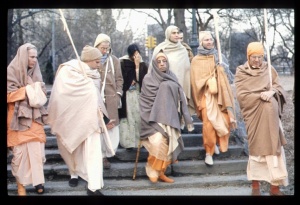BG 1.46: Difference between revisions
(Vanibot #0020 edit - link to the Version Compare feature) |
(Vanibot #0054 edit - transform synonyms into clickable links, which search similar occurrences) |
||
| Line 24: | Line 24: | ||
<div class="synonyms"> | <div class="synonyms"> | ||
''sañjayaḥ uvāca'' | ''[//vanipedia.org/wiki/Special:VaniSearch?s=sañjayaḥ%20uvāca&tab=syno_o&ds=1 sañjayaḥ uvāca]'' — Sañjaya said; ''[//vanipedia.org/wiki/Special:VaniSearch?s=evam&tab=syno_o&ds=1 evam]'' — thus; ''[//vanipedia.org/wiki/Special:VaniSearch?s=uktvā&tab=syno_o&ds=1 uktvā]'' — saying; ''[//vanipedia.org/wiki/Special:VaniSearch?s=arjunaḥ&tab=syno_o&ds=1 arjunaḥ]'' — Arjuna; ''[//vanipedia.org/wiki/Special:VaniSearch?s=saṅkhye&tab=syno_o&ds=1 saṅkhye]'' — in the battlefield; ''[//vanipedia.org/wiki/Special:VaniSearch?s=ratha&tab=syno_o&ds=1 ratha]'' — of the chariot; ''[//vanipedia.org/wiki/Special:VaniSearch?s=upasthe&tab=syno_o&ds=1 upasthe]'' — on the seat; ''[//vanipedia.org/wiki/Special:VaniSearch?s=upāviśat&tab=syno_o&ds=1 upāviśat]'' — sat down again; ''[//vanipedia.org/wiki/Special:VaniSearch?s=visṛjya&tab=syno_o&ds=1 visṛjya]'' — putting aside; ''[//vanipedia.org/wiki/Special:VaniSearch?s=sa&tab=syno_o&ds=1 sa]-[//vanipedia.org/wiki/Special:VaniSearch?s=śaram&tab=syno_o&ds=1 śaram]'' — along with arrows; ''[//vanipedia.org/wiki/Special:VaniSearch?s=cāpam&tab=syno_o&ds=1 cāpam]'' — the bow; ''[//vanipedia.org/wiki/Special:VaniSearch?s=śoka&tab=syno_o&ds=1 śoka]'' — by lamentation; ''[//vanipedia.org/wiki/Special:VaniSearch?s=saṁvigna&tab=syno_o&ds=1 saṁvigna]'' — distressed; ''[//vanipedia.org/wiki/Special:VaniSearch?s=mānasaḥ&tab=syno_o&ds=1 mānasaḥ]'' — within the mind. | ||
</div> | </div> | ||
Revision as of 15:14, 17 February 2024

A.C. Bhaktivedanta Swami Prabhupada
TEXT 46
- सञ्जय उवाच
- एवमुक्त्वार्जुनः सङ्ख्ये रथोपस्थ उपाविशत् ।
- विसृज्य सशरं चापं शोकसंविग्नमानसः ॥४६॥
- sañjaya uvāca
- evam uktvārjunaḥ saṅkhye
- rathopastha upāviśat
- visṛjya sa-śaraṁ cāpaṁ
- śoka-saṁvigna-mānasaḥ
SYNONYMS
sañjayaḥ uvāca — Sañjaya said; evam — thus; uktvā — saying; arjunaḥ — Arjuna; saṅkhye — in the battlefield; ratha — of the chariot; upasthe — on the seat; upāviśat — sat down again; visṛjya — putting aside; sa-śaram — along with arrows; cāpam — the bow; śoka — by lamentation; saṁvigna — distressed; mānasaḥ — within the mind.
TRANSLATION
Sañjaya said: Arjuna, having thus spoken on the battlefield, cast aside his bow and arrows and sat down on the chariot, his mind overwhelmed with grief.
PURPORT
While observing the situation of his enemy, Arjuna stood up on the chariot, but he was so afflicted with lamentation that he sat down again, setting aside his bow and arrows. Such a kind and soft-hearted person, in the devotional service of the Lord, is fit to receive self-knowledge.
Thus end the Bhaktivedanta Purports to the First Chapter of the Śrīmad Bhagavad-gītā in the matter of Observing the Armies on the Battlefield of Kurukṣetra.